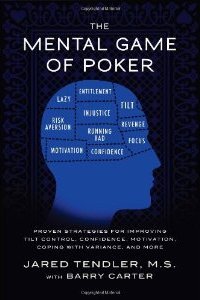Mental Game of Poker Excerpt 2 – Incomplete Information
We have the second excerpt from The Mental Game of Poker written by Jared Tendler & Barry Carter. The book is now available from Amazon.com and Amazon.co.uk.
Incomplete Information
You no doubt have heard poker referred to as a game of incomplete information. The skill in poker comes from creating certainty where there were previously unknowns. You have no idea what hole cards your opponent has been dealt, but you have the ability to put them on ranges, retrace previous hands with them, and pick up on their tells to fill in that missing information. You don’t know the strength of your opponent after playing one hand with them; but if you regularly watch training sites, post on forums, and work on your game, you can learn how to quickly assess their game.
Hypothetically, let’s say there are 10 technical unknowns in any given poker hand. A fish can only fill in one or two of the unknown variables in a hand, whereas a professional player can fill in seven. A professional’s edge comes from their ability to create certainty where weaker players can’t. In other words, they have an informational advantage.
A player is a mental game fish when they lack the proficiency to fill in enough of the unknown variables. Hypothetically, let’s also say that there are 10 technical unknown variables within a mental game issue. Players with anxiety or fear problems typically have the skill to fill in one or two, but believe they have the skill to fill in seven. Since they believe they should be able to figure it out, they scour their mind for the answer. When there’s no answer to be found, their thinking moves faster and eventually races to desperately fill in the unknown variables. They constantly check the cashier, but don’t know why; their mind goes blank when playing $5/$10, but they can’t figure out why it doesn’t happen at lower stakes; or they rush decisions in big pots, but can’t figure out how to slow down.
Trying to fill in more unknowns than is possible given your mental game skill is just like trying to out-level a superior player. Your mind outthinks itself and your results are even worse than if you stuck to what you know. Fortunately, a player fills the unknown variables in the mental game by developing skill in the same way as in poker; only the details differ.
Fuel to Perform
“If you aren’t feeling pressure on the 1st tee of a major golf tournament, you aren’t alive.” — Commonly said on the PGA Tour.
While fear causes a host of problems, when experienced at low levels it can be a major source of fuel for you to perform at your highest level and get into the zone. In pressure situations, it’s common to feel anxious, nervous, excited, amped, or jacked up. However you describe it, having emotion and adrenaline pumping through your body primes your senses to pick up on details you can’t see normally. It’s because you’re picking up on those details that it feels as if the action just flows through you, time seems to slow down, and you just know what your opponent is holding. You’re in the zone thanks to your nerves.
In poker, as in sports, business, and other performance arenas, the ability to thrive under pressure has previously given people a distinct competitive advantage. It’s one that kept them from being naturally selected out of the game. That is until psychology and sport psychology gave people who struggled to perform under pressure a formal way to learn this previously unattainable skill. These people may have been equally, if not more talented, but without the ability to perform under pressure they couldn’t achieve a level of success equal to their talent.
For poker players who lack the ability to perform under pressure, this chapter intends to level the playing field. When addressing issues of fear, the goal is to identify and break down the underlying flaws in your mental game that turn your questions into fear. One example of such a flaw is the belief that feeling anxious or fearful means you’ll perform poorly. Thus, when you previously experienced normal nerves when performing, your mind couldn’t answer the questions: “Why do I feel this way?” and “What does feeling this way mean for my performance?” Your inability to answer these questions created more anxiety, which shut down your mind and made it more likely for you to fail. Over time, you associated anxiety with failing, so you learned that anxiety was inherently bad. Since you learned how to fear your nerves, you can also learn how to use them to play your best poker.
Here are a couple of other benefits that fear or pressure provides:
- Just like tilt, anxiety exposes underlying weaknesses in how you technically play poker and approach the mental game. Basically, it helps you identify what you need to improve.
- Pressure is critical for learning. When your nerves are amped up to the top of the performance curve, you become a learning machine that’s capable of picking up on subtle details in the action that you normally couldn’t see.
By choosing to embrace anxiety, you’re in a great position to capitalize on it.
The Mental Game of Poker, by Jared Tendler & Barry Carter, is now available at Amazon.com and Amazon.co.uk.

